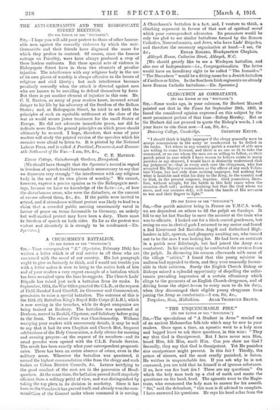THE ANTI-GERMANISTS AND THE BISHOPSGATE STREET MEETINGS.
[TO THE EDITOR OP THE " Srr.crATos."I BiR,—I hope you will add your protest to those of other honour- able men against the cowardly violences by which the anti- Germanists and their friends have disgraced the cause for which they profess to contend. Of course, since the famous outrage on Priestley, wars have always produced a crop of these lawless outbursts. But these special acts of violence in Bishopsgate Street have in them two elements of peculiar injustice. The interference with any religious body in the use of its own places of worship is always offensive to the lovers of religious and civil liberty ; but such interference becomes peculiarly cowardly when the attack is directed against men who are known to be unwilling to defend themselves by force. But there is yet another element of injustice in this case. Mr. C. N. Buxton, as many of your readers know, incurred actual danger to his life by his advocacy of the freedom of the Balkan States ; and, at Bishopsgate Street, he tried to set forth the principles of such an equitable settlement at the close of the war as would secure juster treatment for the small States of Europe. Ho did not advocate immediate peace, nor did he indicate more than the general principles on which peace should ultimately be secured. I hope, therefore, that some of your readers will study the printed version of the speeches which his enemies were afraid to listen to. It is printed by the National Labour Press, and is called A Practical, Permanent, and Honour- able &filmed of the Wer.—I am, Sir, &c., C. E. MAEMICE. Eirene Cottage, Gainsborough Gardens, Hampstead.
[We should have thought that the Spectator's record in regard to freedom of speech would have made it unnecessary to say that we deprecate very strongly " the interference with any religious body in the use of its own places of worship." We cannot, however, express a precise opinion as to the Bishopsgate meet- ings, because wo have no knowledge of the facts—i.e., of how the disturbances arose, who were the disturbers, or the amount of excuse offered them, &c., &c. If the public were invited to _attend, and if attendance without protest was likely to lead to a claim that a crowded public meeting unanimously voted in favour of peace on terms favourable to Germany, an orderly but well-marked protest may have been a. duty. There must he freedom of speech on both sides. So far as the protest was violent and disorderly it is strongly to be condemned.—ED. Spcc!ator.]


































 Previous page
Previous page